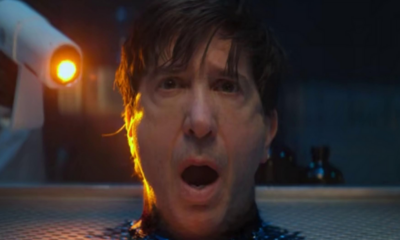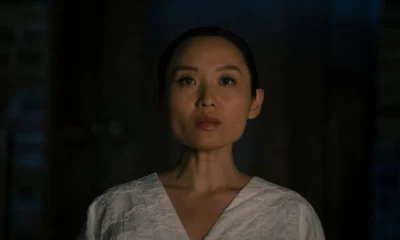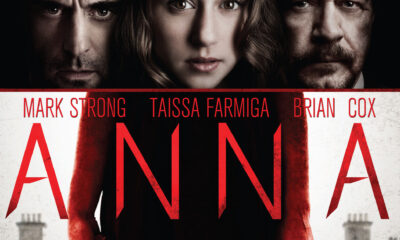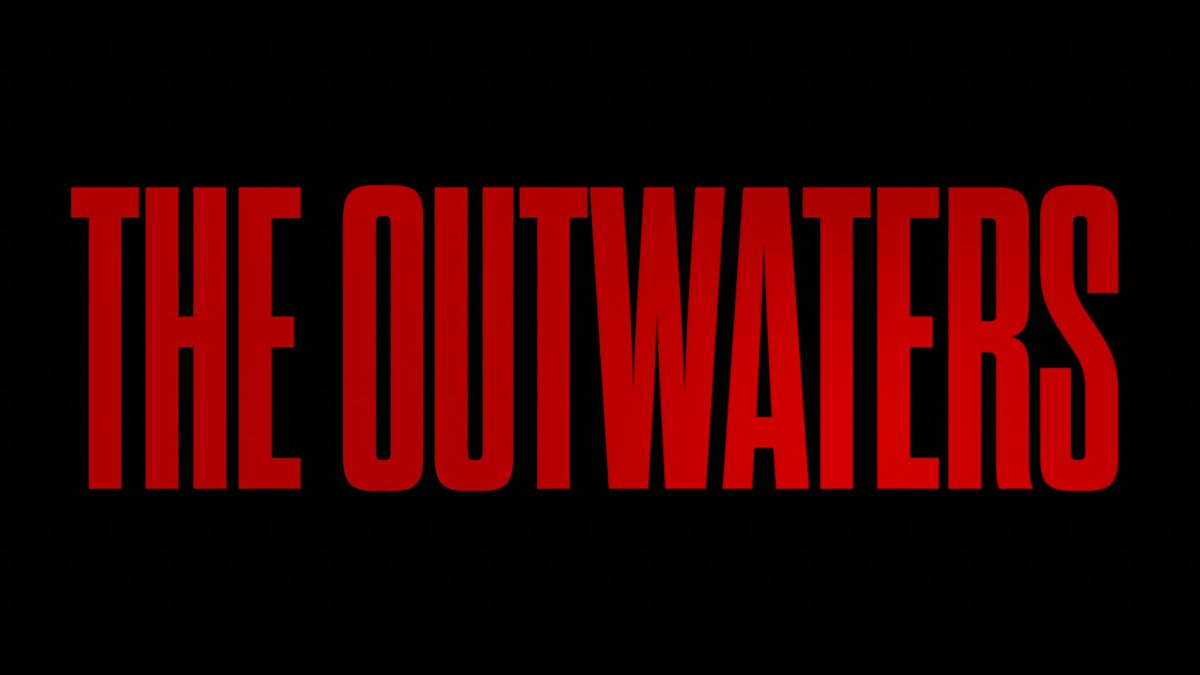
The Outwaters Review: Fear the Dark!

“The Outwaters” is available to stream now, exclusively on ScreamboxTV!
The found footage subgenre is one that requires specific taste and often comes under much scrutiny due to most of them being small independent films with minimal budgets, unknown actors, and the often complained “shaky cam” aesthetic. While these are valid complaints, especially when sifting through a massive library of repetitive tropes and half-assed knockoffs, there are some that manage to sift through the cracks and redefine the subgenre with positive results; whether good or bad. Films like the popular “Paranormal Activity”, produced on a shoe-string budget, only to spawn an entire franchise. Or the infamously reviled “Cannibal Holocaust”, a film shrouded in so much controversy, director Ruggero Deodato was actually placed on trial for the murder of the films actors, even though they were among the living. One also cannot forget the cult classic ’99 film, “The Blair Witch Project”; though it may not have started the found footage subgenre, it most certainly popularized it. “The Outwaters”, written and directed by Robbie Banfitch, is unlike any of the films I previously mentioned, but rather, a jarring new experience unlike any you’ve witnessed. An experimental vision that is exquisitely haunting, graphically perverse, and will leave you terrified of what dwells in the dark.
A Cosmic Journey through Hell
“The Outwaters” unsettling tale of terror follows cameraman Robbie Zogorac (also played by Banfitch) as he takes a trip to the Mojave Desert in hopes to film a music video with his best friend and muse, Michelle (Michelle May). Joining these two companions are Robbie’s distant brother Scott (Scott Schamell) and lastly, their close friend and make-up artist Ange (Angela Basolis). Their majestic trip is quite uneventful at first, as they serenade themselves with music, explore small caverns, and take a quick dip in a quaint little lake filled with glistening teal water. Everything seems to be going perfectly as laughs are being shared whilst they reminisce of memories past and discuss previous hallucinogenic experiences. It is not until these four souls arrive at their camping site when events begin to go awry, bringing their peaceful trip to a savage halt. Ominous booms and cracks of lightning-less thunder begin echoing the night sky, pounding louder with each passing minute. The desert animals howling in fear as vibrations begin to ripple through the ground and surrounding boulders. What was meant to be a trip of bonding and music, quickly shifts into a hellish reality of visceral carnage and cosmic horror.
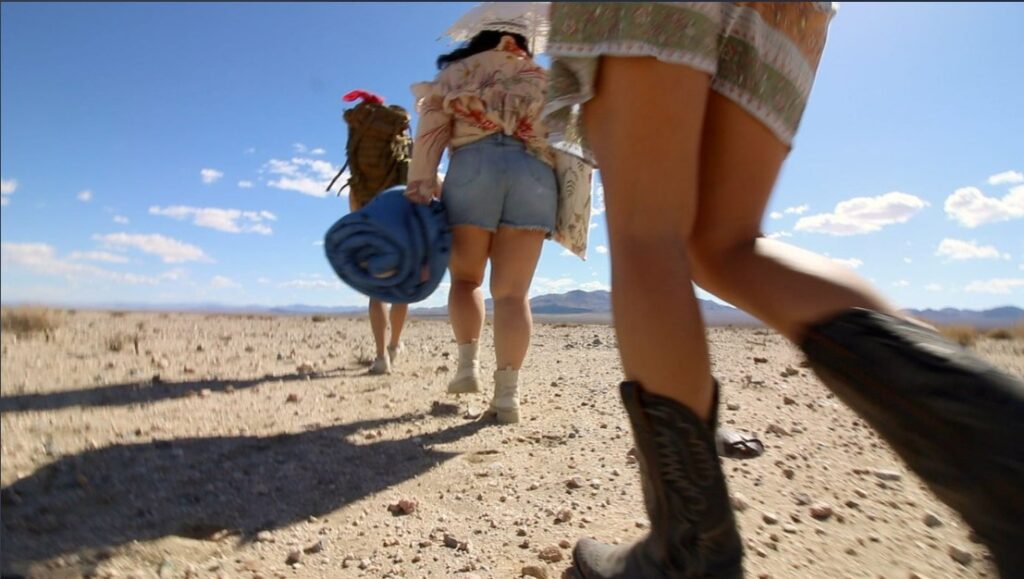
Banfitch wastes no time setting the tone for “The Outwaters” by opening the film with a bone chilling recording from a 911 call. Though the title sequence only lasts roughly 30 seconds, the blood-curdling screams mixed with violent gargling sounds and otherworldly noises shrieking through my soundbar sent shivers down my spine. This is only a mere taste of what’s to come later, as the all too familiar setup we have come to expect with most found footage horror films is nothing more than misguided direction. Banfitch takes us by the hand guiding us ever-so gently through the Mojave Desert with a false sense of serenity. He is able to achieve this by including sultry melodies, scenic views, and vivacious multi-colored sunsets bleeding through our screens. Once the light fades and the dark floods over, Banfitch does not hesitate to spiral us down a polarizing descent into gruesome chaos, affectively leaving us to navigate his nightmarish concoction alone and disoriented. Relying only on a single camera and the smallest of flashlights to navigate through the black of night, the small circle of light providing the briefest glimpses to the blood drenched carnage that has ensued, saturating the desert floor. It’s within these moments where the story evolves into something more, relying heavily on its auditory horror and blending of visual stimulations.
Redefining a Subgenre
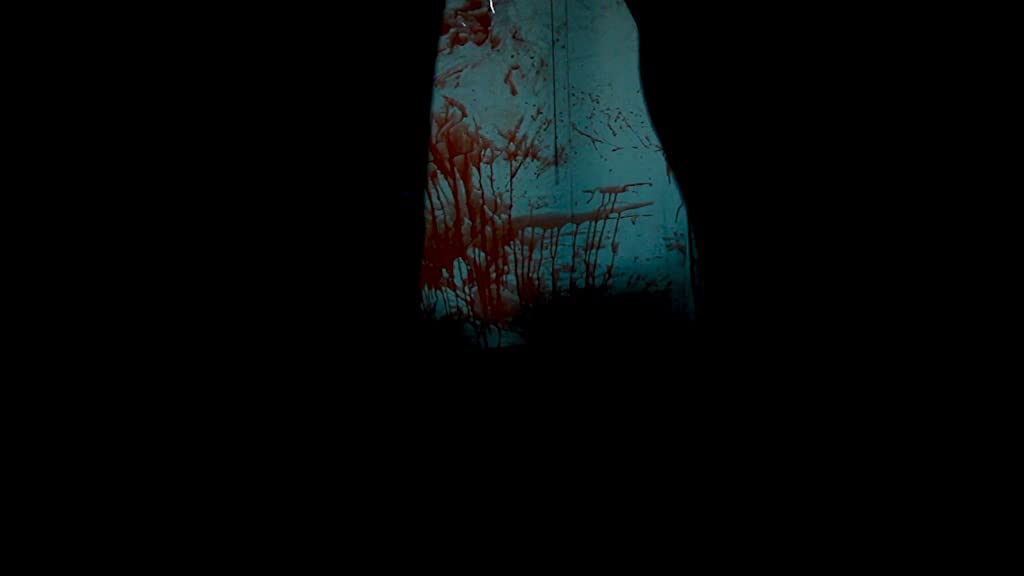
While most found footage horror films rely heavily on cliche jump scares, “The Outwaters” instead opts to push its narrative forward with its often times disturbing yet melodic sound design. Michelle’s voice is angelic, soothing the soul as she sings to the light strums from Scott’s guitar. As the film progresses, the calming music evolves into neural despair as Michelle’s voice grows more distorted throughout, building to the inevitable sensory assault that lies in wait. Screeches from slithering creatures mixed with distant roars from anonymous beasts resound in the distance, however, we rarely see these monsters. Rather, Banfitch viciously blindfolds his audience and aggressively shoves them in the dark, forcing us to imagine the extreme brutality being perpetrated off-screen. While there are slight elusions to a more sinister force, it’s the horrific screams from Robbie’s friends the left me feeling uneasy.
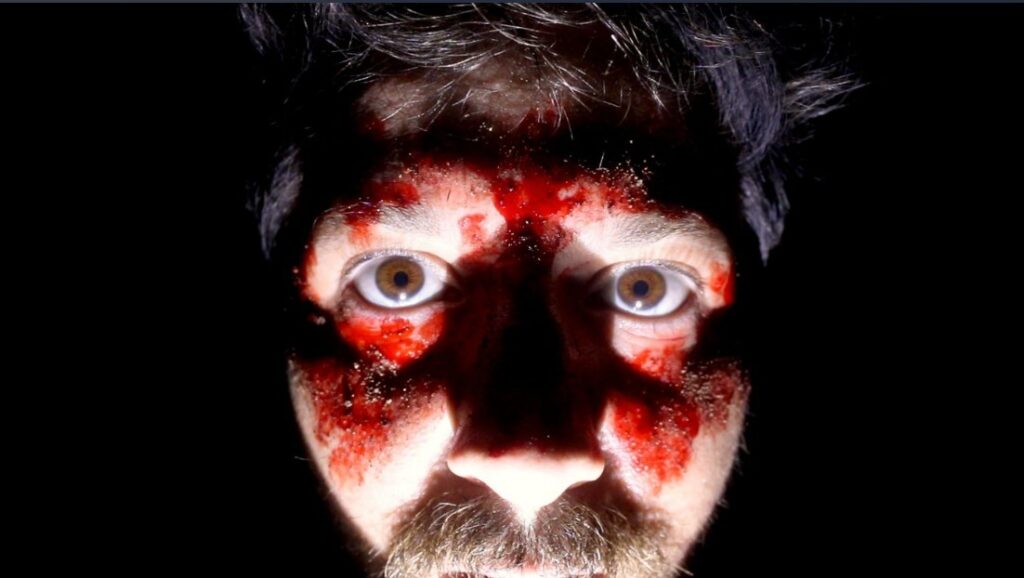
The performances in “The Outwaters” are nothing short of impressive, including Banfitch as “Robbie”. This in part due to the on-screen chemistry between the actors but, mostly because of how well written each character is. While we aren’t provided much backstory for these victims, they are graced with enough personality for us to develop emotional attachments for each individual. Michelle is a free-spirited new age hippie, seducing us with her alluring voice; Ange captivates with her outgoing personality and comedic timing, while Scott is quiet and reserved. When the laughter and smiles of these characters suddenly shifts to shrieks of agonizing pain, one can’t help but squirm in unpleasantness. Following the night of slaughter, we are left witnessing Robbie’s further descent into hell disoriented, afraid, naked, and alone. He wanders the desert aimlessly crying for help, praying in-between each plead. The more he interacts with a certain flashing ripple of light, the further he loses grip over reality and himself.
What’s unfortunate during “The Outwaters” unwavering brutality is how little is actually revealed visually during the more chaotic moments, especially with a run time nearing two hours. Much of the latter half of “The Outwaters” consist of Robbie filming numerous shots of his feet shuffling in the desert as he reacts to the sounds around him, headache inducing red strobe lighting effects, and extreme close-ups. Those hoping to see any grand reveal of the films ominous monsters or the savagery that befalls on Robbies friends will be met with disappointment. Rather than reward us with visible validation, apart from the films climax, Robbie frustratingly pulls the camera away or turns his already minimal light off. This is disappointing due to the fact Banfitch clearly shows early in “The Outwaters” first half he’s not only a skilled cinematographer but meticulously plans the creativity behind his angles. Whether that be spinning our perspective upside down for juxtaposition, or eerie wide lensed outlines of hatchet wielding shadow figures painted in purple hues. It would have been nice to see more of these creative camera angles at play as opposed to the anonymity we’re forced to endure.
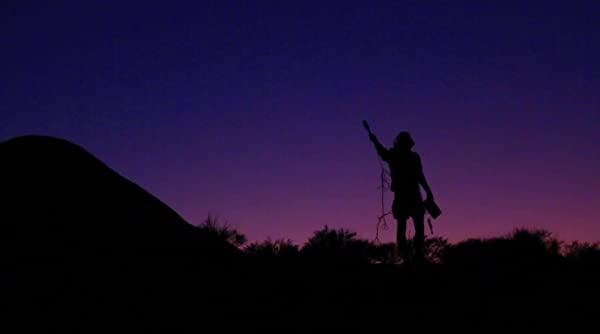
Final Verdict
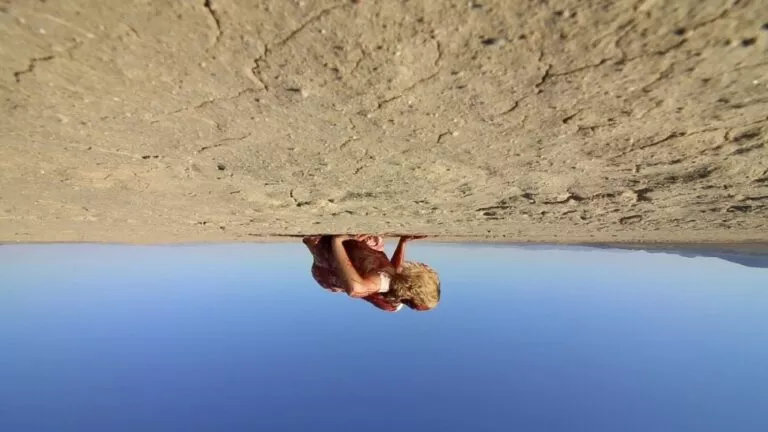
“The Outwaters” is a bold new take on a subgenre that has since grown somewhat stale throughout the years. Writer/Director/Actor Robbie Banfitch dares to redefine the found footage tropes by catapulting the audience into his amalgamation of time loops, religious undertones, and exponential cosmic dread. What makes “The Outwaters” even more impressive is the singular effort that went into creating this film as Banfitch also edited and provided the visual effects. While the first act’s slow burn aesthetic dwells a bit long and the constant pitch-black setting can be exhausting, there wasn’t a time in which I didn’t find myself completely absorbed in Robbie’s depraved journey through hell, constantly guessing what might happen next. Much like the recent “Skinamarink”, “The Outwaters” is an experimental visual experience that will be divisive yet talked about for years to come. You will either find yourself engrossed in the surreal psychedelic nightmare, or utterly confused by the vile images that unfold before your eyes. We all die in the dark.
 (4 / 5)
(4 / 5)
Movies n TV
Wheel of Time A Question of Crimson Is a Political Espionage Delight
Episode two of Wheel of Time felt like the beginning of a long journey. Stories are unfolding, lives are changing, and blood is spilling.
Let’s discuss.
The story
We begin this episode in the past with Elayne’s mother, Queen Morgase. It turns out her rise to the throne was a bit, shall we say, cutthroat. So when she shows up at the White Tower, Siuan is concerned.
She might have reason to be, too.
Meanwhile, Rand, Egwene, Moiraine, Lan and Aviendha are in the Spine of The World. As they travel through some of the most breathtaking lands I have ever seen on a TV show, Egwene is plagued with nightmares. We think at first that’s just her trauma working itself through her system. But we soon find out that it might not be that straightforward.
Finally, Perrin returns home to heal after his hand is almost cut in half. But when he gets there he finds the town has been infested by Children of The Light. And they’re looking for him.
What worked
There was something heartwarming in this episode about political espionage and choking religious persecution. And that is Elayne’s relationship with her family.
I have consumed a lot of fantasy content with royal families. And I have never once heard a princess call her mother ‘Mum’. I’ve never seen royal siblings get along. And I have sure as hell never seen a princess have a good relationship with her step-parent.
This was refreshing. Even though Queen Morgase is kind of a horrible person she seems like a good mother. And that’s an unexpected delight.

Of course, this is just one storyline among many. And while this can sometimes be overwhelming, in this case it wasn’t.
I’ll be honest, some of these storylines are going to drag for me. I know this because I’ve read some of the Wheel of Time books and I have an idea that not all the characters exactly pique my interest.
No one likes all the characters. No one likes all the storylines. While I am here for the political espionage between Queen Morgase and Siuan, not everyone likes it. While others might be fascinated with Selene trying to win Rand back, I couldn’t care less.
Having multiple storylines keeps everyone’s attention better. So long as things don’t get out of hand. Things can easily get out of hand. But this seems to be managed well.
So far.
What didn’t work
As I mentioned above, I’m not thrilled with Rand’s story at this point. And while it’s fine to not like a storyline when there are this many to choose from, it’s not fantastic that the one I like the least is the one involving our two main characters. And anytime we were with the team at the Spine of The World, the only thing that brought me joy was Moirain’s hat. It reminded me of Stockard Channing’s hat in Practical Magic.
The problem is that Rand is Charlie Brown with controversial magical powers. He is boring, serious, and pessimistic.
And yes, I understand that he has a heavy emotional burden and he’s the Dragon Reborn and that’s quite taxing and all. But let’s be fair, there isn’t a single person in this show that doesn’t have a heavy burden. And most of them manage to be fun occasionally.

All that being said, this episode of Wheel of Time did exactly what it needed to do. It set up conflicts at each of the three locations. It established emotional ties between the characters and the events. And it established goals for everyone.
This was, in short, a solid episode. Not groundbreaking, not mind-blowing or life changing. It was simply good. It was entertaining and moved the plot forward.
Well done.
 (3.5 / 5)
(3.5 / 5)
Movies n TV
Wheel of Time Returns With A Bang
Wheel of Time is back for season three. There are mixed feelings regarding this. Last season, there were some serious pacing issues. And some serious sticking to the book’s storyline issues. But we’re two seasons in, and we don’t give up so easily. So let’s dive into episode one, To Race the Shadow.
By the way, I highly recommend watching this episode with the subtitles on. You’ll see why.
The story
We begin this episode with Liandrin facing a trial of sorts for her rampant betrayal. She does her best to gaslight her Aes Sedai sisters into thinking that Siuan Sanche is the real traitor.

When that doesn’t work, she reveals how many Black Aes Sedai have actually infiltrated the tower.
Spoiler, it’s a lot.
In the aftermath, our whole team gathers to drink and enjoy one night of relaxation before they head out to the Tear to form an army for Rand. All is going well until they’re attacked by myriad creatures and a sentient axe.
What worked
This episode was long. It had a run time of an hour and eleven minutes. And a lot of that run time was spent in heavy dialog scenes.
Fortunately, these were well-done scenes.
If you’re going to have a lot of talking scenes, there are good ways and bad ways to do it. Last season, we saw lots of examples of the bad way to do it. But this episode did it well. For one thing, other things were going on while conversations were taking place. The characters are drinking, playing games, walking through an interesting city. And the scenes themselves didn’t stretch out. They weren’t repetitive. We heard what the character had to say, then we moved on.
It was also nice that the point of these scenes wasn’t just info dumps. We had character development. We had romantic interactions. We had plot development and foreshadowing.
Overall, this episode felt like what it was. A moment of calm before a storm.
Taking a step back, I’d be remiss if I didn’t address the fight scene at the start of the episode. Because it was epic.
The magic looked amazing. The martial arts that went along with it looked fantastic. The costumes were beautiful. It was just incredibly fun to watch.
More than that, it was emotional. We lost some characters in that fight that were important. And it was clearly emotionally shattering for many of our characters, who found themselves betrayed by people they trusted.
So many of them.
It was a great way to open the season.
What didn’t work
Despite that, this episode wasn’t without its flaws.
First off, there were a lot of dialog scenes. And they were good scenes, as I’ve already discussed. But it was one after another after another. And when your episode is, again, an hour and eleven minutes, it’s maybe a little much to have so much chit-chat. Couldn’t some of these conversations, important as they were, have been moved to maybe another episode?
Finally, I want to talk about Egwene’s travel through the arches.

I feel like maybe there were some deleted scenes here. Because there must have been more to that visit than what we saw, right?
We could have seen Egwene battle Rand. That would have been badass and emotionally devastating. We could have seen her with a quiet life with Rand back home at the Two Rivers. We could have seen anything except for the quick clip of Rand in a bloody river, followed by Egwene being shoved back out in a bloody shift.
Bad job. But at least it wasn’t an extended scene of Moiraine collecting bathwater, and then taking a bath while looking sad. If we’d started this season with another scene like that, it might have broken my brain.
Amazon dropped the first three episodes at once. So we’ll be back soon to talk about episode two. See you then.
 (4 / 5)
(4 / 5)
Movies n TV
Entertaining as hell: Eight Legged Freaks (2002) Review
Early 2000s is a special era for the industry. It accepts the cheesiness and corniness of movie making, in turn producing some gems in their own right. Eight Legged Freaks starring David Arquette and young Scarlet Johanson is a horror comedy about giant spiders who overtake a small town. As crazy as that premise sounds, the movie surprisingly has a ton of heart and is super entertaining. Let’s review, shall we?
Plot
We start Eight Legged Freaks with a shot of toxic waste spilling into the water supply of Joshua, a spider farm owner. He is friends with Mike, one of our protagonists, who is a science geek and a spider enthusiast. Mike notices something quite right upon visiting Joshua, but no one takes him seriously. We are then introduced to the rest of the crew. Mike’s mother Samantha, the town sheriff, is too busy chasing Ashley, his sister, who is dating the town mayor’s son Bret (something Samantha does not approve of). We also have Chris, who returns to the town to save his father’s legacy in the town mines. He has opposition from Wade, Bret’s father, who wants to use the mines for his business ventures. Lots of drama going on that will only get juicier once the spiders get loose.
The creepy crawlies quickly dispose of Joshua and make their grand appearance after Ashley rejects Bret’s advances, abandoning him in the middle of a desert. A glorious chase sequence ensues as the spiders make their way towards the town, wreaking havoc on its residents. In a true horror fashion (which the movie acknowledges), it takes some convincing from Mike and then from Samantha for the town to take the threat seriously. The tongue-in-cheek style of narrative adds the comedy aspect to a movie that would otherwise burn out fairly quickly.
The remaining characters hide out in a shopping mall as it’s the only somewhat sturdy building in the area. This doesn’t last long as the spiders break in, forcing them to run through the mines. Their resources to fight the creepy crawlies off are limited as the methane gas doesn’t allow them to use firearms. Such conditions require resourceful thinking from Chris, who uses perfume to fend off the leader of the spider group and save himself during the climax of the movie.
Character dynamics are not forgotten once the action kicks in. We have Chris confessing his long-term feelings for Samantha which she knew all along, which provided some comedic relief. Bret also reunites with Ashley and apologises for being an asshole. Mike finally gets the appreciation he deserves as his knowledge saves the townsfolk more than once during the whole ordeal.
We end the movie with the town’s radio show person telling the story as an urban legend during his segment. This brings it into question – how much of it happened the way he said it did? We can only guess…
Overall thoughts
Eight Legged Freaks is a fun creature feature with some self-aware commentary on genre tropes that doesn’t take itself too seriously. The acting is good, the pacing fitting and the characters are likeable enough for you to want them to make it through. Definitely a must watch, if you don’t suffer from arachnophobia, that is.
 (5 / 5)
(5 / 5)




